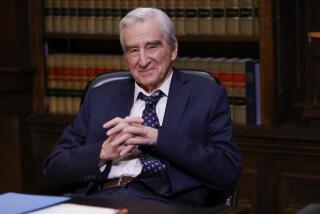A ‘Dennis Farina type’? There was only one
Dennis Farina, who died Monday at the age of 69, was in his late 30s before he acted a lick. He had been a Chicago police detective consulting on Michael Mann’s 1981 film “Thief” when the director gave him a small role. He didn’t go Hollywood in an instant but began a second career in his hometown, moonlighting in film and theater until 1986, when Mann cast him as the lead in the TV series “Crime Story,” as, of all things, a Chicago detective who follows a mobster to Las Vegas in the early 1960s, and he quit the (actual) force. He stayed busy in his new life.
Farina was one of those actors so completely himself that a call for a “Dennis Farina type” could lead only to him. Directors made as much use of the person he was as the many people he could be. Tall, with a bony face, an imperial head of hair and a mustache he made cool when mustaches weren’t cool, he was graceful in his movements and comfortable in his skin -- which was rough by Hollywood standards of beauty -- craggy, pitted and human.
At the same time, that type wasn’t simple: Each quality seemed also to contain its contradiction. He was a Sicilian American from Chicago, mixing the Mediterranean and Midwest, the exotic and the homespun, the dark and the light. (But he never hid that flat, broad accent.) His characters were affable, with an edge of danger; or dangerous, with a core of affability. He looked distinguished and beat up at once; he had a natural authority, but also a modesty; he was enthusiastically vulgar -- there are fan-made clip reels that highlight his characters’ profanity -- even as he was somehow delicate and genteel. He could get big and loud without sounding strident, but much of the time coasted along on a kind of chesty, drily seductive purr.
Much of his career was spent playing cops and criminals, though he played them in all sorts of attitudes and flavors, and he could easily relax into the character of a wine fancier in the historical comedy “Bottle Shock” or play a scene from a bubble bath (Ed Burns’ “Sidewalks of New York”). Barry Sonnenfeld employed him to comic ends as a mob boss in “Get Shorty” and a swinging detective in the sadly short-lived CBS 1998 series “Buddy Faro.”
As a sidekick to mobster Dustin Hoffman in the Mann-directed, David Milch-created “Luck,” which lived a little while last year on HBO, Farina was quiet and naturalistic. The constant exposition of “Law & Order,” which he joined for a couple of seasons as a not-too-dissimilar replacement for Jerry Orbach, did not suit him quite as well; you can see him looking for opportunities to flirt and connect. In the last TV and movie roles to appear in his lifetime, he played hustlers: Jake Johnson’s flamboyant, estranged con man father in “New Girl,” and the down-on-his-luck aging title character in Joe Maggio’s moody “The Last Rites of Joe May,” which returned him to home-turf Chicago.
Actors who do not set out to be actors, who come to it late, have a special quality: They’ve lived other lives, not merely imagined them, and they carry them into their pretending. Dennis Farina was one of those.
More to Read
The complete guide to home viewing
Get Screen Gab for everything about the TV shows and streaming movies everyone’s talking about.
You may occasionally receive promotional content from the Los Angeles Times.







